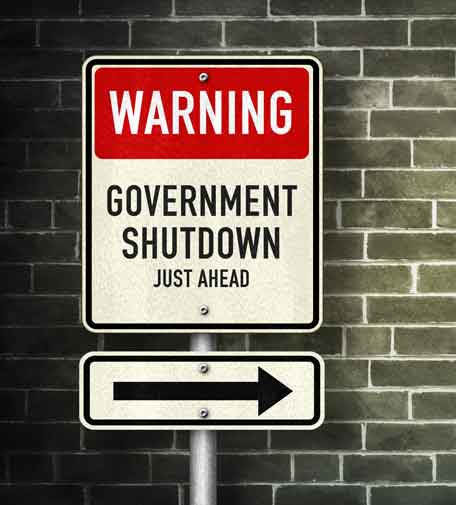
When the government shuts down the people responsible continue to receive their pay because they are considered "essential." These include the president and members of Congress. It reminds me of when it snows in Washington (as opposed to the snow jobs we get all year from politicians). The guy on the radio says, "only essential workers need to report to work." Let's find out who they are and get rid of the rest. That would substantially reduce our $34 trillion national debt and cut the size of the federal government, the nation's largest employer. The threat of another government shutdown reminds me of movies some of the cable channels repeatedly run. Even films I love eventually reach a saturation point as they become overly familiar. It is the same with reruns of government shutdowns. Government shutdowns are a relatively recent phenomenon. As the History Channel recounts, the first one happened in November 1981, Ronald Reagan's first year in office. Reagan vetoed a spending bill he thought should have cut more domestic programs. The shutdown lasted only a few days and the spending continued. The second shutdown occurred in the fall of 1982 and for the nuttiest of reasons. As The New York Times reported: " Congress missed the deadline because both major parties had events they didn't want to miss: Republicans were attending a White House barbecue and the Democrats had a fundraising dinner." The next one happened in mid-October of 1984. It lasted only half a day because Reagan was cruising toward re-election and Democrats quickly caved, a rarity. In 1990, House Speaker Newt Gingrich, responding to President George H.W. Bush' s broken promise not to raise taxes, led a Republican rebellion against a spending bill, triggering a shutdown that led to the closing of national parks and museums. The media then, as now, always heads for the parks and museums to show their "closed" signs, as well as trumpeting the scare tactics of Democrats who claim retirees might not get their Social Security checks. During the Bill Clinton administration, the government was closed for 21 days over opposition to major spending cuts. In 2013, there was a 16-day shutdown during the Obama administration, caused by a dispute over implementation of the Affordable Care Act. In late 2018, another funding gap triggered the longest shutdown in U.S. history. The argument was over President Trump's proposed plan to build a wall along the U.S. border with Mexico. As the History Channel notes: "The shutdown led the government to furlough 800,000 federal workers. Democrats refused to fund the wall, and ultimately Republicans relented. The shutdown ended a month after it began with no funding in place for a border wall." How's that looking with millions of migrants, including criminals and drugs, flooding the country? There's no reason to recount the other shutdowns because it's all political theater. With only a few variations they have looked like reruns of a familiar movie. The real problem – too much spending, too much growth in government power, too much debt and a failure to cut unnecessary and outmoded government programs – is rarely addressed, especially by the media, which prefers arguments over solutions. If the pay of the president and members of Congress could be cut when faced with a shutdown, there likely would be no more of them. Unfortunately, like the hope some people have for term limits, the people who have created the problem pay no penalty for their refusal to do what used to be called the right thing. In gangland days such threats were called extortion. Today, it is politics as usual. It is why so many hate Washington. If voters continue to vote for the people who have created the problem they will continue these reruns and get what they deserve. (COMMENT, BELOW)
Cal Thomas, America's most-syndicated columnist, is the author of 10 books.


 Contact The Editor
Contact The Editor
 Articles By This Author
Articles By This Author